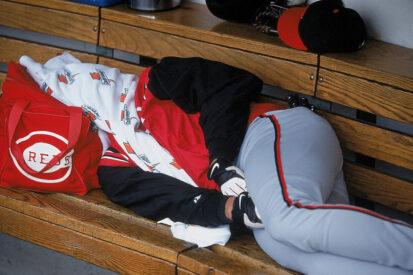Why is it important to learn how to keep your composure as a ball player? There are many different reasons, but the main one is to ensure that you do not let a situation define you. As you have heard before, actions speak louder than words. If you express your emotions through action, your opponent will know exactly what you are thinking and you become an open book. Have you ever seen someone throw their helmet or cry after striking out? Have you ever seen a pitcher spike his glove into the ground or throw his hands up at a missed called strike? We have all seen this happen which tells you exactly what they are thinking. They are defeated!
I am sure that you can guess what happens after someone comes back pouting over a bad call that the player has no control over. It turns into a snowball effect. Maybe it results in an error on the field, or another strike out next at bat, or walking 3 batters straight. Regardless of the situation, that is why it is important for every ball player to learn how to keep their composure.
One negative example I can think of is when I was facing a pitch who was sitting 97 mph. I took the first pitch for a ball, which was low and away (a ball off at shin height). The next pitch I fouled a ball off into the bleachers over the third base dugout. It was a 1-1 count, and the next pitch I took as well. It was in the same spot as the first pitch, but the umpire called it a strike. My thoughts were, “how can you call that pitch a strike when it was in the same spot as the first one?” “The pitcher is sitting 97 mph, give me a chance.” “Now it’s a 1-2 count when it should be a 2-1 count.” “I should just swing at everything since he’s gonna call pitches like that a strike.” Obviously, the rest of the at-bat did not go well.
A positive example was during my last season of professional baseball, a pitcher threw a slider inside and it curved right into my back foot. I looked at the umpire, who had no reaction, and told him, “I am guessing that you didn’t see that hit my back foot.” He smiled and said that he didn’t. What did I do? I shrugged it off, focused on the next pitch, and hit a double down the first base line.
Those two examples above are situations that are fairly common, but it is how you respond that will make the difference in your game. Here are a three components that go into learning how to keep your composure.

- Take a second to assess the situation
In order to do so, you must take a step back, take a deep breath, and see the situation from an objective stand point. In my negative example, I did not take a step back or a deep breath. I just rushed myself into getting myself out. In my positive example, I changed my perspective to the umpire’s view and knew instantly that he did not see the ball hit my foot. It was tough to see from his standpoint. All I could do was take a deep breath and look ahead to the next pitch and focus on that.
- Respond Appropriately
Responding appropriately is the action you take immediately after a situation. Once you take a step back and a deep breath, you have a choice on how to respond. In the negative example, I responded by just rushing back into the box without complete focus on the next pitch. My focus was on the previous call, which resulted in me getting out. In the positive example, I chose to move onto the next pitch because I was still in the at-bat. That resulted in my double.
- Reflect on your decision
Reflecting on your decisions are important because you need to understand if it was the right decision or not. From there, you can make the necessary adjustments the next time a similar situation arises. I realized from my negative example that I must remember to shift my focus onto the next pitch. The umpire is human and bad calls are inevitable so I must forget the previous pitch and direct all my attention to the next one. That is exactly what I did for the positive example so I would respond the same way if that situation happened again.
In baseball, you face many different situations and you have the choice on how to respond. Take a second to assess the situation, respond appropriately, and reflect on your decisions. Take the time to learn these three components in order to give yourself the best chance for success on the diamond.








